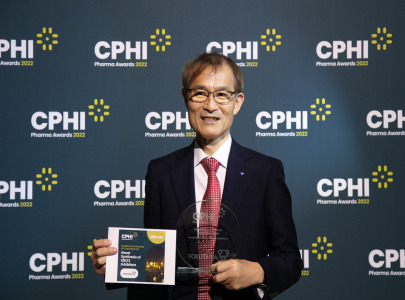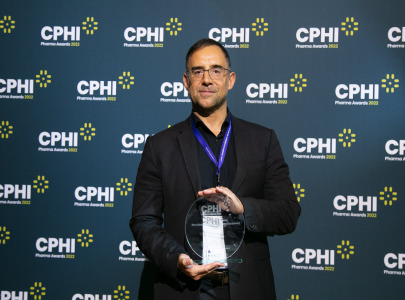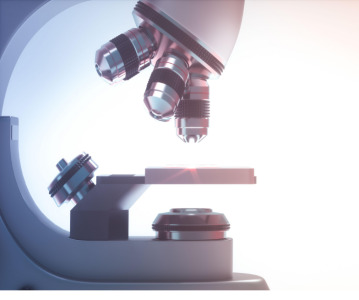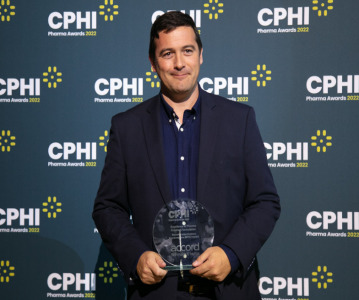CPHI Frankfurt 2022: Innovator Interview - Sharp
.png)
In this series of interviews, we speak to companies on the CPHI Frankfurt show floor who are driving innovation in pharma for a better healthcare future. We spoke with Alexander Schäfer, BD Manager Europe of Sharp to understand the current landscape of pharmaceutical packaging after various supply chain issues in the last year, and what the future holds for them and the industry.
Please could you give a brief overview of your role at Sharp?
My role is to find pharma clients that need packaging solutions for their products in the European market. We work to tailor solutions.
What are some key developments/achievements that have occurred for Sharp in the last two years?
One of the biggest achievements over the last 2 or 3 years is that we are all still here, having overcome all the huge challenges related to the COVID pandemic. Something we are proud of is that we were able to grow our business during what was a very challenging time. We’ve added new capacity and new capabilities over the past 2 or 3 years, although that might not be a surprise given the nature and scale of the crisis, and the related demand for pharmaceutical packaging. For example, we invested in expanding our clinical services capabilities, moving several operations into our Dutch site in Heerenveen, which is now our second clinical services site offering these capabilities in the EU. We expanded the Dutch site by creating space for handling gene therapy products, which might require -60 to -80 degrees storage, it might require packaging over dry ice, which is a new area we are able to support. We also expanded our capacity for injectables packaging, which is still an area of big demand. We invested into new assembly capabilities for autoinjectors as well as pen injectors, so we can cover assembly and packaging capabilities for ‘off the shelf’ devices.
Sharp also acquired a minority stake in the BSM manufacturing in the US during 2021, with the intention to fully acquire next year, which will give us the ability to offer fill finish capacities in the US, a natural extension to our existing service offering and an area of high demand.
As a leader in the clinical supply chain and pharmaceutical packaging, what challenges has Sharp faced in the last few years? Related not only to the pandemic, but to the energy crisis, the war in Ukraine?
Yes, top of the list is that we had to adapt very quickly, with a lot of our business functions going remote, meaning non-production staff worked from home offices. We had to put in place the infrastructure and processes to support remote working. This is also true for visits to site, we had to establish new ways to support customer visits virtually, video site tours, live walkthroughs of the production rooms, to enable our customers to make decisions about their products that Sharp was handling. There are also some very solid issues remaining, like the supply chain issues, for example in China; we might have containers sitting in China for two years, that’s still a challenge as it can impact our ability to deliver on time.
Staffing resources is another issue. Lots of the workforce just disappeared from the job market, and some of those positions still haven’t been filled in. Because of this, we had to be very resourceful in finding the right talent at the right time.
The energy crisis and the crisis in Ukraine are not helping either. The energy prices are a major challenge and remain a threat to our industry, also material cost increases are happening across the board. Lead times went up substantially due to supply and staffing and resource issues. The whole industry is impacted by this in the same way.
China and India are some of the biggest sources of APIs and excipients, and with all the lockdowns, this has meant that some of our customers were delayed in supplying drug products. This has a knock-on effect on the whole supply chain.
Have you considered reshoring or diversifying your portfolio?
These situations have given initiatives a push, whether companies are looking to bring certain operations back into Europe, diversifying resources or have some other back-up. Not because of political reasons but from a supply chain efficiency perspective.
How do events such as CPHI aid companies like Sharp in addressing these challenges?
CPHI worldwide is the most important show for us, the biggest opportunity for us to showcase what we can do, our new capacities and capabilities. Getting in touch with partners and clients in person makes such a big difference! After all, it’s still all about people, it’s about building personal relationships, getting in touch with people again, and we’re finding that clients and partners are grateful to be able to meet with us again too. CPhI is a great platform for that and makes networking in one place so much more efficient. The whole industry is gathering here in Frankfurt again, finally!
Sustainability is a topic of increasing importance for all in the pharmaceutical industry, and Sharp has made a commitment to limiting the impact on the environment, how have you been working to achieve this?
It might not necessarily be very visible, but sustainability is one of the major topics in the industry today. Our customers' main expectation of us as a service provider is that we support their Scope 3 GHG emissions reduction objectives. Sustainability is becoming increasingly important at Sharp, and we have just hired a full-time Sustainability Manager, which indicates how much work is ongoing in this area at Sharp. Operating sustainably is no longer a nice to have, but a requirement now if you are to remain competitive. To give you a couple of examples of sustainability initiatives; we are implementing solar panels as part of our sustainable energy strategy, and we have purchased 100% green energy for all our facilities. We are investing in ‘top-loading’ Dividella machines, which allows us to reduce the amount of packaging. We are also engaging with our own supplier network, in how they can support us in reducing our own carbon footprint. We are now 100% landfill free across all of our facilities. One of our most rewarding sustainability initiatives so far was co-founding the Alliance to Zero, a pharma supply chain alliance whose objective is to reduce GHG emissions through collaborating to offer net zero auto-injectors by 2030. All pharma industry organisations must play their part in emissions reduction, it is no longer a choice. Sharp believes collaboration across the pharma supply chain will have the fastest positive impact on carbon reductions.
Any other highlights from Sharp you’d like to mention?
One thing, in addition to what we’ve just discussed, is that we have been heavily investing in Dividella top loading machines. This is addressing a couple of requirements in the market – sustainability is one – but also more efficient and cost-effective packaging solutions. That’s a great fit for the industry for these solutions. We invested in 4 new machines, there will be more to come, and they offer a great opportunity for Sharp’s clients in the US and in Europe.
Related News
-
News CPHI Pharma Award Winners 2022: Pharmaceutical Packaging & Drug Delivery – Evonik
In this series of interviews, we speak to the teams behind the winning concepts at CPHI Pharma Awards 2022, which was held at CPHI Frankfurt, across the categories from digital innovation to CEO of the year. -
News CPHI Pharma Award Winners 2022: Digital Innovation – ATMPS Ltd
In this series of interviews, we speak to the teams behind the winning concepts at CPHI Pharma Awards 2022, in each of the different categories, from digital innovation to CEO of the year. -
News CPHI Pharma Award Winners 2022: Supply Chain, Logistics, and Distribution – HCLTech
In this series of interviews, we speak to the teams behind the winning concepts at CPHI Pharma Awards 2022, in each of the different categories, from digital innovation to CEO of the year. -
News CPHI Pharma Award Winners 2022: CEO of the Year – Aragen Life Sciences
In this series of interviews, we speak to the teams behind the winning concepts at CPHI Pharma Awards 2022, in each of the different categories, from digital innovation to CEO of the year. -
News CPHI Pharma Award Winners 2022: API Development – Tokuyama Corporation
In this series of interviews, we speak to the teams behind the winning concepts at CPHI Pharma Awards 2022, which was held at CPHI Frankfurt, across the categories from digital innovation to CEO of the year. -
News CPHI Pharma Award Winners 2022: Manufacturing, Tech, and Equipment – Just-Evotec Biologics
In this series of interviews, we speak to the teams behind the winning concepts at CPHI Pharma Awards 2022, in each of the different categories, from digital innovation to CEO of the year. -
News CPHI Frankfurt 2022: Innovator Interview - Lonza Small Molecules
In this series of interviews, we speak to companies on the CPHI Frankfurt show floor who are driving innovation in pharma for a better healthcare future. Here, we spoke to Henny Zijlstra, Senior Director, Commercial Development at Lonza Small Molecules... -
News CPHI Pharma Award Winners 2022: Finished Formulation – Accord Healthcare
In this series of interviews, we speak to the teams behind the winning concepts at CPHI Pharma Awards 2022, in each of the different categories, from digital innovation to CEO of the year.
Position your company at the heart of the global Pharma industry with a CPHI Online membership
-
Your products and solutions visible to thousands of visitors within the largest Pharma marketplace
-
Generate high-quality, engaged leads for your business, all year round
-
Promote your business as the industry’s thought-leader by hosting your reports, brochures and videos within your profile
-
Your company’s profile boosted at all participating CPHI events
-
An easy-to-use platform with a detailed dashboard showing your leads and performance
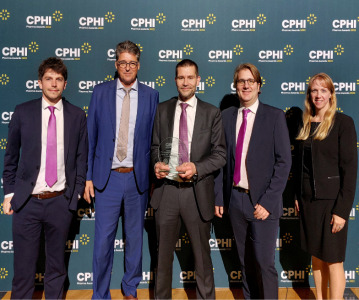
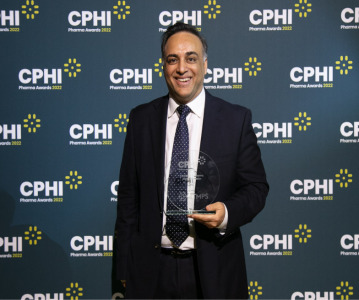
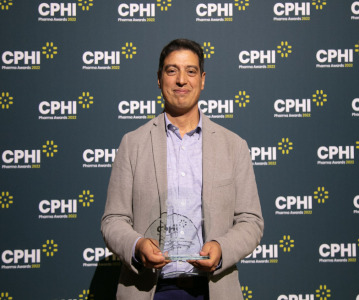
.png)
